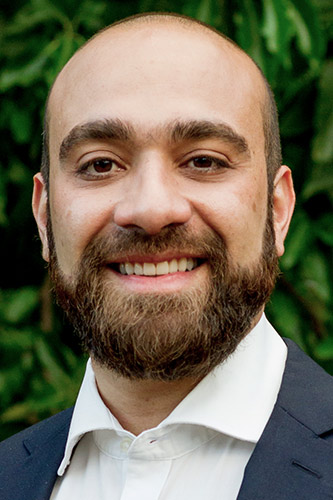
 The Internet Corporation for Assigned Names and Numbers (ICANN) is a not-for-profit corporation, which essentially functions as a governing body for the Internet and brings together representatives from government, civil society, academia, the private sector, and the technical community. Despite its importance in crafting policies related to world wide web development, a significant portion of digital rights lawyers underestimates ICANN’s regulatory role in contrast to one of the national governments. more
The Internet Corporation for Assigned Names and Numbers (ICANN) is a not-for-profit corporation, which essentially functions as a governing body for the Internet and brings together representatives from government, civil society, academia, the private sector, and the technical community. Despite its importance in crafting policies related to world wide web development, a significant portion of digital rights lawyers underestimates ICANN’s regulatory role in contrast to one of the national governments. more
 Imagine that you run an organization out of a building. Imagine that the landlord comes one day and says, "Oh I didn't know you are a resident of country X or dealing with anybody from country X. I have to close this place down right now." And then you are done. You don't have an organization anymore. This very scenario happens on the Internet. more
Imagine that you run an organization out of a building. Imagine that the landlord comes one day and says, "Oh I didn't know you are a resident of country X or dealing with anybody from country X. I have to close this place down right now." And then you are done. You don't have an organization anymore. This very scenario happens on the Internet. more
 When we first heard of the possibility of broadband from low-orbit satellites, there was a lot of speculation that the technology could bring affordable broadband to the masses around the globe. The latest announcement from Starlink shows that affordable broadband is probably not coming in the immediate future. Starlink announced a premium tier of service with a $500 monthly fee for 150-500 Mbps. more
When we first heard of the possibility of broadband from low-orbit satellites, there was a lot of speculation that the technology could bring affordable broadband to the masses around the globe. The latest announcement from Starlink shows that affordable broadband is probably not coming in the immediate future. Starlink announced a premium tier of service with a $500 monthly fee for 150-500 Mbps. more
 The last few decades have not been a story of unqualified success for European technology enterprises. The European industrial giants of the old telephone world, such as the former stalwarts Alcatel, Siemens, Philips, Ericsson and Nokia, have found it extraordinarily difficult to translate their former dominant positions in the telco world into the Internet world. To be brutally frank, none of the current generations of major players in the digital environment are European. more
The last few decades have not been a story of unqualified success for European technology enterprises. The European industrial giants of the old telephone world, such as the former stalwarts Alcatel, Siemens, Philips, Ericsson and Nokia, have found it extraordinarily difficult to translate their former dominant positions in the telco world into the Internet world. To be brutally frank, none of the current generations of major players in the digital environment are European. more
 Voice over IP (VoIP) represents a sharp break from the traditional telephony. The story of VoIP is important in helping us think beyond the simplistic framing of a "digital transition". The first stage of any technology is emulating the old. Indeed, digital telephony was just like traditional analog telephony -- just FBC (Faster, Better Cheaper) but not fundamentally different. Merely changing from analog to digital isn't transformational in itself. But it creates the opportunity for transformation. more
Voice over IP (VoIP) represents a sharp break from the traditional telephony. The story of VoIP is important in helping us think beyond the simplistic framing of a "digital transition". The first stage of any technology is emulating the old. Indeed, digital telephony was just like traditional analog telephony -- just FBC (Faster, Better Cheaper) but not fundamentally different. Merely changing from analog to digital isn't transformational in itself. But it creates the opportunity for transformation. more
 Nielsen recently published some statistics about how we watch videos that show a continuing trend of migration from traditional video to watching video online. One of the most striking statistics is the total volume of online videos. December 2021 saw an aggregate of 183 billion minutes of online video viewing. And even that, the number is likely small since there are many uses of video on the web that are not likely counted in the total. more
Nielsen recently published some statistics about how we watch videos that show a continuing trend of migration from traditional video to watching video online. One of the most striking statistics is the total volume of online videos. December 2021 saw an aggregate of 183 billion minutes of online video viewing. And even that, the number is likely small since there are many uses of video on the web that are not likely counted in the total. more
 Nowadays, with increasing digitalization and internet usage, email is a central communication tool. This holds true even despite the high popularity of instant messaging apps and social media. Email remains the favorite means of business communication worldwide, both in B2B and B2C. In 2019, 293.6 billion emails were sent and received. By 2025, this number will grow even more. It is predicted that we will send and receive 376.4 billion emails per day. In this scenario, implementing security features for email communications has become absolutely essential. more
Nowadays, with increasing digitalization and internet usage, email is a central communication tool. This holds true even despite the high popularity of instant messaging apps and social media. Email remains the favorite means of business communication worldwide, both in B2B and B2C. In 2019, 293.6 billion emails were sent and received. By 2025, this number will grow even more. It is predicted that we will send and receive 376.4 billion emails per day. In this scenario, implementing security features for email communications has become absolutely essential. more
 The EARN IT Act was reintroduced into Congress last Monday, with the promise that it would end Internet platforms' "blanket immunity" for "tens of millions of photos and videos" of child sexual abuse that they allow to circulate online. With the bill already scheduled for hearing in committee, it's on track to be passed quickly. And why shouldn't it be, if its sponsors' claims about it are true? Perhaps because they're not true. more
The EARN IT Act was reintroduced into Congress last Monday, with the promise that it would end Internet platforms' "blanket immunity" for "tens of millions of photos and videos" of child sexual abuse that they allow to circulate online. With the bill already scheduled for hearing in committee, it's on track to be passed quickly. And why shouldn't it be, if its sponsors' claims about it are true? Perhaps because they're not true. more
 Time has come again, another year of general elections in Brazil. Some 30,000 candidates are running for Executive and Legislative seats: 1 President, 27 State Governors, 27 Federal Senators, 513 Federal Deputies, 1059 State Deputies, 24 District Deputies to govern 212+ million people and one of the largest economies in the world. For a few lucky industries, success and failure do not correlate with who is in power; for others, policy and regulation are everyday business. more
Time has come again, another year of general elections in Brazil. Some 30,000 candidates are running for Executive and Legislative seats: 1 President, 27 State Governors, 27 Federal Senators, 513 Federal Deputies, 1059 State Deputies, 24 District Deputies to govern 212+ million people and one of the largest economies in the world. For a few lucky industries, success and failure do not correlate with who is in power; for others, policy and regulation are everyday business. more
 In 2020, China applied to operate GuoWang, a constellation of 12,992 low-Earth orbit (LEO) broadband Internet satellites, and in 2021, it became clear that it was intended to become China’s global LEO broadband constellation. Can they do it? Maybe, but it will take a long time. China does not have the capacity to launch 12,992 satellites today. I don’t know the mass of their planned satellites, but GuoWang is informally referred to as China’s answer to Starlink. more
In 2020, China applied to operate GuoWang, a constellation of 12,992 low-Earth orbit (LEO) broadband Internet satellites, and in 2021, it became clear that it was intended to become China’s global LEO broadband constellation. Can they do it? Maybe, but it will take a long time. China does not have the capacity to launch 12,992 satellites today. I don’t know the mass of their planned satellites, but GuoWang is informally referred to as China’s answer to Starlink. more